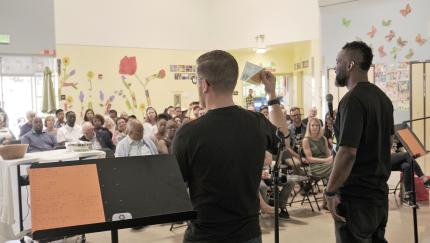Two Churches Are Bridging the Racial Divide

Pastor Bernard Emerson and Pastor Kyle Brooks speak to worshipers at Tapestry Church.
Tapestry Church
Two churches are tackling Oakland, California’s gentrification and racial division head on: they’re merging.
Bernard Emerson started The Way Church in Oakland three and a half years ago. One year later, Resonate Partner Kyle Brooks planted Oakland Communion. This year, the two congregations joined to form Tapestry Church.
“We come from different church traditions and different church backgrounds,” said Bernard. One church is Baptist; the other is Christian Reformed.
Yet the most significant difference between the two congregations stems from the ongoing tension from Oakland’s gentrification. When Bernard and Kyle first met at a cohort focused on social justice, The Way Church was a congregation of black, long-time Oakland residents, while Oakland Communion was a predominantly white church of Oakland transplants. The congregations stood on two separate sides of the city’s deep racial divide.
“We were actually doing this exercise that helps to viscerally show—embody—how the current racialized system divides us and stratifies us,” Kyle said. “Basically, we met sitting on opposite sides of that room on that exercise and realized ‘hey, we gotta talk to one another on this.’”
They talked.
And then began inviting one another to their church’s events.
“Our congregations got a taste of him and me, and we slowly began to work our ways into the equation,” said Bernard.
But the two did not want to assume a mutual bond between their two congregations based on their relationship alone. While the congregations had periodically worshipped together and attended events together, Bernard and Kyle knew their churches needed a deeper connection.
Over Memorial Day weekend in 2017, the two church families joined together for a retreat funded by Resonate Global Mission.
“We prepared meals together. Ate together. We shared times of prayer together,” said Bernard. “It was just a way of us getting our congregations into one another’s lives.”
One part of that retreat was a fireside chat entitled “Stuff We Had to Work Through,” in which Bernard and Kyle shared about their relationship and the ways they had to grow to stay committed to one another.
At the time, the two pastors hoped for The Way Church and Oakland Communion to reach full unification by the end of 2018—yet even the year-and-a-half timeline seemed ambitious.
They compare the congregation’s walk toward unification to climbing Mount Everest. “You have to climb a bit and then set up a basecamp to adjust to the elevation before climbing again,” Kyle said. “We had been at basecamp a little while.”
And then Charlottesville happened.
White national supremacists rallied in Charlottesville, Virginia, in August 2017 to protest against the removal of a statue of Confederate icon General Robert E. Lee. The demonstration turned violent, killing three and injuring more than 30 people.
“The events of Charlottesville called for a tangible response,” said Bernard. “Our response had to be something sustainable. Our response was bringing our churches together and showing the world we can do this. We can live in unity. I believe the church has to be a model for the world. If racial unity is going to happen in this world, it has to be modeled by the church.”
The Tapestry Church’s first worship service as a unified body was on Sunday, June 3, 2018.
“I’m thrilled about two congregations becoming one in Tapestry Church,” said Ben Katt, Resonate’s Regional Mission Leader for the Western US. “It reflects our vision for churches that reflect our essential gospel calling to be a people reconciled in Christ across the divides.”
Tapestry Church describes their body as “a tapestry of many cultures woven together into the fabric of Oakland to display the beauty of God’s story.” Kyle shares they are a multiethnic church with people who share a common history that includes some very deep injustice, wounds, and trauma.
“We know that in our confession, God is going to receive us,” Kyle said. “Our status is not earned in having a perfect history in regards to race relations … The best testimony we could give of the power of the gospel was not to start from the scratch but to merge our congregations into one existing church.”
Kevin Schutte, Mission Shaped Congregations Leader for Resonate, notes that Tapestry Church’s unification is about putting others first.
“Each church has to be willing to serve the other church, be willing to submit to the other church. Each church has to see beyond past histories of racial or ethnic perceptions to what a new identity in Christ looks like, which eliminates those divisions and unifies the body.”
He hopes that the Tapestry Church’s unification is catalytic for what church plants can do moving forward.
Both Bernard and Kyle hope so, too.
“The support of Resonate and other people has been instrumental in making this happen,” Kyle said. “We are under no illusion that we are doing this alone. We are very grateful God brought us this care and support. We really don’t want to be unique in this. We want to be a part of a large group of people who are part of this work.”
Tapestry Church was featured on KTVU TV before their June 3 service. Watch the clip.


